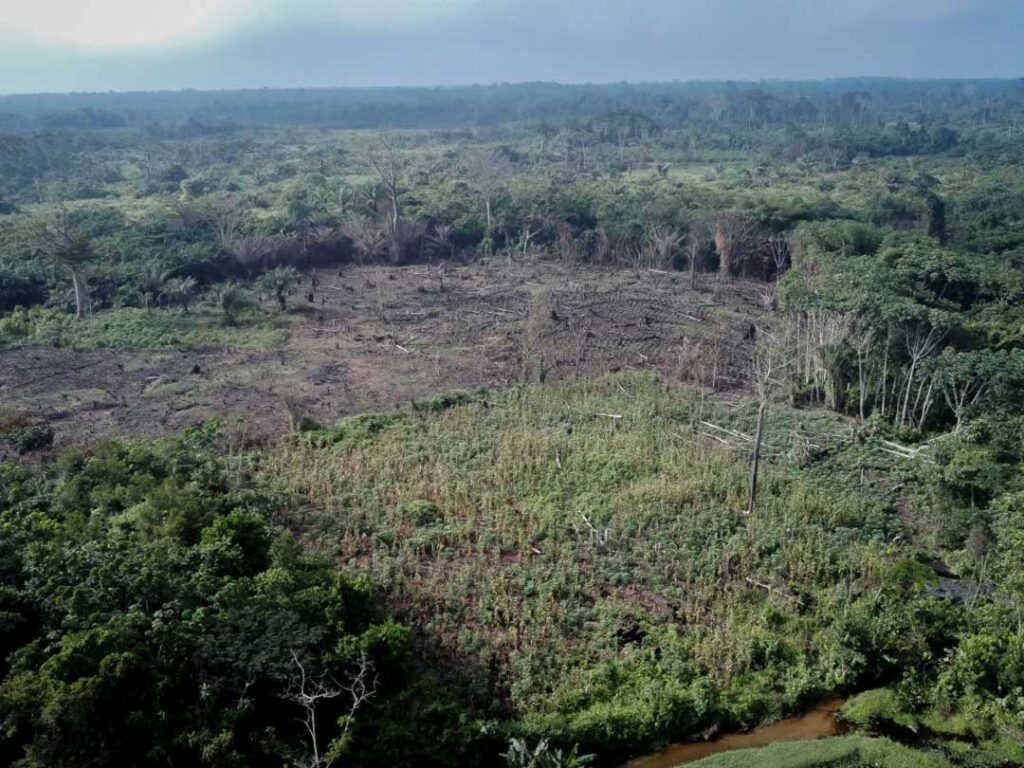ADF STAFF
A new study reveals how a Chinese logging company is illegally leveling rainforests in the Democratic Republic of the Congo (DRC), stripping the country of millions of dollars’ worth of irreplaceable natural resources and fueling corruption.
China’s Congo King Baisheng Forestry Development (CKBFD) controlled nine logging concessions in the Democratic Republic of the Congo (DRC), the study said, yet the company often logged illegally outside its boundaries.
Despite receiving a suspension from the DRC’s Ministry of the Environment in April 2022, CKBFD continued to log illegally. In the second half of 2022, it shipped more than $5 million worth of illegal timber from its bases in the DRC to a port near Shanghai, according to an investigation by the nongovernmental organization Global Witness.
Among other things, the report highlights the governance issues that cause problems in the logging industry in the DRC, including corruption, illegal practices by loggers, and conflict with forest communities, according to the Global Witness study.
“As one of [the] biggest consumers of timber globally, China can be a key part of the solution to global deforestation, and the Chinese authorities must crack down on companies exploiting the DRC’s precious forests for profit,” Global Witness forest investigator Charlie Hammans said in the report.
Global Witness reached its conclusions on CKBFD by reviewing satellite images of the company’s nine concessions areas in central DRC and by examining Chinese customs data.
“Our investigation reveals that despite having their concessions suspended by the government, Chinese-owned CKBFD continued to wreak havoc in the DRC, tearing down old-growth rainforest and exporting millions of dollars’ worth of illegal timber to China,” Hammans stated.
The Congo rainforest is sometimes referred to as the earth’s second lung — the first being the Amazon rainforest in South America — because its dense tree canopy and abundance of plant life capture carbon dioxide and pump oxygen into the atmosphere.
Over the past 20 years, the DRC has lost more than 18.4 million hectares of tree cover, partly due to deforestation driven by companies such as CKBFD, according to Global Forest Watch.
CKBFD is not alone is its illegal logging in the DRC. When a commission of DRC ministers visited 52 logging concessions this year, it found that fewer than a quarter of them were operating legally, according to Global Witness.
A 2014 study by Chatham House found that nearly 90% of the logging done in the DRC was illegal. China’s hunger for teak and mahogany-like sapele hardwoods fuels the rampant illegal logging of the DRC’s tropic forests, according to Global Witness. The timber is used in Chinese-made furniture.
Corruption also drives the destruction of the DRC’s rainforest, according to an audit of the logging industry the DRC government released in 2022. That report revealed that a succession of government ministers awarded logging concessions despite a 2002 moratorium on new logging contracts. In some cases, concessions were reclaimed by the government then turned over to other companies, also in violation of the moratorium.
“The forest administration did not respect the moratorium that it itself established,” the auditors reported. “This is nothing less than the outright sale of forest concessions.”
The government also was lax when it came to collecting fees from logging companies, auditors reported.
Despite DRC programs to reforest areas of deforestation, Chinese companies such as CKBFD are logging at a rate that is five times the volume of timber their permits allow, analysts say.
Chinese officials told Global Witness they have no way to track the legal status of timber arriving from the DRC.
DRC-based conservationist Blaise Mudodosi, coordinator at Actions pour la Promotion et Protection des Peuples et Espèces Menacés, told Global Witness that must change.
“The Chinese government must take measures to stop this flow of illegal timber from the DRC and other Congo Basin countries and must also provide financial and technical assistance to the DRC to help it effectively curb this flow and sustainably manage its forests,” Mudodosi said. “The future of the Congo Basin rainforest depends on it.”

